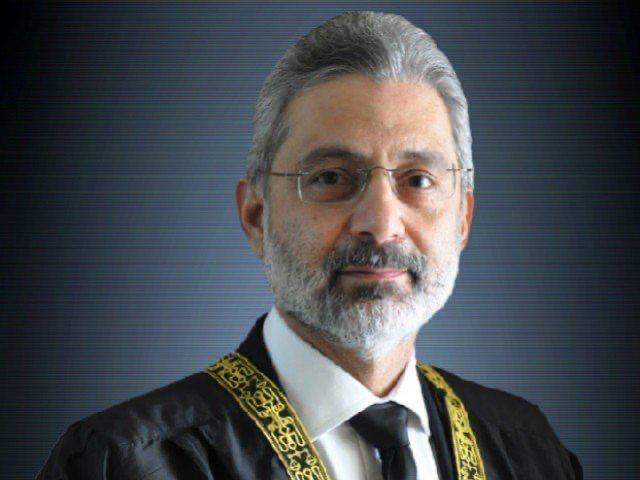
ISLAMABAD: Supreme Court Judge Justice Qazi Faez Isa has raised serious questions over the composition of a larger bench to the hear presidential reference seeking interpretation and scope of Article 63 (A) of the Constitution.
In a three-page letter written to Chief Justice of Pakistan (CJP) Umar Ata Bandial, the senior puisne judge of the Supreme Court has raised eyebrows over several aspects of the structure of the bench, including the absence of senior-most judges from it and the procedural method not taken into consideration while constituting it.
He pointed out that no senior-most judge was consulted while constituting the bench to hear the cases, on which the eyes of the entire nation are set, adding this was troubling because it could potentially give rise to unnecessary and avoidable misgivings.
“After all the adage – justice is not only be done but is also seen to be done – has been oft-repeated by the Supreme Court,” the justice recalled in the letter.
“The said adage is also incorporated in Article IV of the Code of Conduct, which is to be observed by Judges of the Supreme Court and of the High Courts. Likewise, a Judge must avoid all possibility of his opinion or action, in any case, being swayed by any consideration of personal advantage, either direct or indirect.
A copy of the letter has also been sent to Attorney General for Pakistan (AGP) Khalid Jawed Khan and Supreme Court Bar Association (SCBA) President Muhammad Ahsan Bhoon along with all advocate generals and SC judges.
The letter comes after Justice Umar Ata Bandial constituted a five-member larger bench to hear the presidential reference seeking the apex court’s opinion on Article 63 (A) and a petition of the Supreme Court Bar Association (SCBA).
The larger bench, headed by the CJP and comprising Justice Ijaz Ul Ahsan, Justice Mazhar Alam Khan Miankhel, Justice Muneeb Akhtar and Justice Jamal Khan Mandokhel, will hear the presidential reference, seeking interpretation of Article 63 (A) of the Constitution, and the SCBA petition for restraining political parties from holding public meetings in Islamabad before voting on the no-confidence motion.
In his letter, Justice Isa – who is among the top court’s senior-most judges – took exception to the inclusion of the judges who are 4th, 8th and 13th on the seniority list to the bench “by discarding a good practice of a predecessor of yours, who had structured the chief justice’s discretion by constituting benches comprising of the senior-most judges when cases involving important constitutional questions were to be heard.”
Justice Isa said that Article 191 of the Constitution stipulates that, ‘Subject to the Constitution and law, the Supreme Court may make rules regulating the practice and procedure of the Court.’
“The Supreme Court Rules, 1980 (‘the Rules} have been enacted. Order XI of the Rules attends to the Constitution of Benches, which power, like every other power and discretion, the manner of exercise of which is not specified, must, as stipulated by law, be ‘exercised reasonably, fairly, justly and for the advancement of the purposes of the enactment and in exercising discretion ‘give reasons.”






